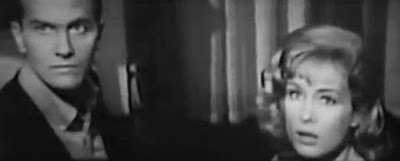 |
| Virginia Christine, Burt Lancaster, Ava Gardner |
Torpedoes Max (William Conrad) and Al (Charles McGraw) come to the town of Brentwood and (improbably) announce to people in the diner that they are going to kill a guy known as the Swede or Pete Lund (Burt Lancaster), which they do. The rest of the film presents assorted flashbacks from various points-of-view as insurance investigator Jim Reardon (Edmund O'Brien) tries to find out more about "Lund" and the reasons for his murder. Reardon hooks up with former cop Sam Lubinsky (Sam Levene) and discovers that the latter's old friend the Swede, actually Ole Anderson, a former boxer, was mixed up in a robbery plot as well as with a beautiful if duplicitous female named Kitty (Ava Gardner). But before Reardon's investigation is over, those two torpedoes just may have more work to do.
The Killers is a fine and memorable piece of film noir. In his very first film, Lancaster gives a strong performance and he is backed up by an old pro in O'Brien. Conrad and McGraw certainly make in impression in their brief but chilling appearances. Levene and Virginia Christine (Anderson's old girlfriend and now Lubinsky's wife) are solid as well. And then there's Ava Gardner in her 27th film, but clearly still growing as an actress. She makes a good impression in the early scenes but doesn't quite cut it in her climactic moments. There are good turns from Phil Brown [Weird Woman] as Nick Adams, Vince Barnett as old Charleston, Albert Dekker as the architect of the robbery plot, Donald MacBride as Reardon's boss, Jack Lambert [The Unsuspected] as a member of the gang, Queenie Smith as Queenie, Anderson's sole beneficiary, and especially Jeff Corey as Blinky. (Charles Middleton plays a farmer but I didn't spot him.) Although Anderson is in some ways an unsympathetic character, you can't help but feel sorry for the miserable way in which he is played for a sucker. The Killers boasts an evocative score by Miklos Rozsa and fine photography by Elwood (Woody) Bredell. Waiting for death: Burt Lancaster
Verdict: Totally absorbing, very well-acted crime drama. ***1/4.










